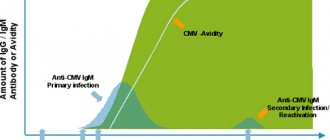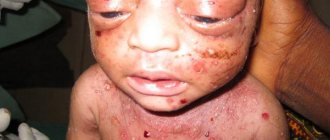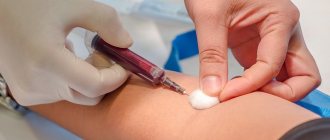general characteristics
Treponema pallidum has several antigens that cause the production of antibodies. One of them is similar to cardiolipin, which makes it possible to use the latter to detect immunity to Treponema pallidum. RPR is a screening anticardiolipin test (non-treponemal) for detecting antibodies (reagins) of the IgG and IgM class to lipoid and lipoprotein-like material released from damaged cells of a patient with syphilis. Antibodies are detected in 70 - 80% of people with primary syphilis and in almost 100% of patients with secondary and early latent syphilis. In most cases, a positive RPR reaction is observed 7 to 10 days after the appearance of the primary chancre or 3 to 5 weeks after infection, then titers decrease. About 30% of patients with late syphilis become non-reactive on the RPR test. A decrease in RPR titer by 4 or more times within 1 year after therapy confirms its effectiveness. In 90 - 98% of cases after treatment for syphilis, the RPR test result becomes negative. The test is not specific, so false-positive reactions may occur. Antilipoid antibodies can appear frequently in autoimmune diseases. If a positive result is obtained in the RPR test, the patient should be examined by a dermatovenerologist with an additional blood test - antibodies to Treponema pallidum IgG/IgM. These two studies are complementary; the combination of RPR and the IgG, IgM ELISA test represents the best screening test for detecting or excluding syphilis at all stages.
How is it done and what kind of blood is needed for analysis?
The material for analysis can be any blood, either from a vein or from a finger. The specificity and reliability of the analysis depends on many factors. It is important to consider that this is a nonspecific test that has a large number of false positive and false negative results. Therefore, it cannot be relied upon with complete confidence in any case. This is due to the fact that blood from a finger can only be examined using the microprecipitation reaction
It allows you to quickly determine the presence of antibodies in the body. But their specificity cannot be determined. Such antibodies can be any proteins formed in large quantities during any infectious processes, immediate or delayed allergic reactions. This means that the true disease can masquerade as a false positive RW and be mistaken for syphilis. On the other hand, venous blood from a finger is not able to detect small concentrations of specific antibodies to the causative agent of syphilis in the initial stages of the disease or during its sluggish course. This causes a false negative result.
Important to remember! The diagnostic value of a finger prick blood test for RW is so low that it makes this method of conducting it impractical in medical practice. More reliable results can only be obtained by examining venous blood. Unlike finger prick analysis, which makes it possible to examine only a small amount of whole capillary blood, plasma can be obtained from venous blood, which contains all the antibodies circulating in the body!
Do not forget about the correctness of the research. It is best to donate blood in the morning or at least on an empty stomach. The day before, strong physical and psycho-emotional stress is excluded. It is advisable to minimize the administration of drugs that affect the activity of the immune response and cause an allergic reaction.
Interpretation:
- If anticardiolipin antibodies are detected, a “positive” response is given with a titer value. At very low titers, the answer is “doubtful, it is recommended to repeat the study after 10 - 14 days.” Positive: RPR - primary seropositive syphilis (infection occurred 1 - 3 months ago); secondary seropositive syphilis (infection occurred more than 3 months ago); tertiary seropositive syphilis (infection occurred more than 3 - 4 years ago); the first year after treatment of syphilis; seroresistance after treatment of syphilis; APS is probable (if syphilis is excluded). False positive reaction (see interference).
- In the absence of anticardiolipin antibodies, the answer is “negative”. Negative: absence of infection, early primary (seronegative) syphilis cannot be excluded, late tertiary syphilis cannot be excluded.
Sample result (PDF)
Complexes with this research
Pregnancy planning.
Diagnosis of infections 14 tests for expectant mothers 8,620 ₽ Composition Male infertility. Extended examination Analysis of male reproductive health 29,030 ₽ Composition
Male check-up No. 1 39 studies for annual preventive examination 18,570 ₽ Composition
IN OTHER COMPLEXES
- Examination during pregnancy. 1st trimester 16,690 RUR
- Eight infections. Complex for men 5,310 ₽
- Expanded hospital complex RUB 7,700
- Preparation for IVF for a man 6,060 RUR
- Joining IVF RUB 23,020
Sources
- Nawaz Z., Rasool MH., Siddique AB., Zahoor MA., Muzammil S., Shabbir MU., Javaid A., Chaudhry M. Prevalence and risk factors of Syphilis among blood donors of Punjab, Pakistan. // Trop Biomed - 2021 - Vol38 - N1 - p.106-110; PMID:33797532
- Tabatabavakili S., Aleyadeh W., Cerrocchi O., Janssen HLA., Hansen BE., Bogoch II., Feld JJ. Incidence of Hepatitis C Virus Infections Among Users of Human Immunodeficiency Virus Pre-exposure Prophylaxis. // Clin Gastroenterol Hepatol - 2021 - Vol - NNULL - p.; PMID:33737225
- Chan P., Colby DJ., Kroon E., Sacdalan C., Pinyakorn S., Paul R., Robb M., Valcour V., Ananworanich J., Marra C., Spudich S. Clinical and laboratory impact of concomitant syphilis infection during acute HIV. // HIV Med - 2021 - Vol - NNULL - p.; PMID:33728759
- Larscheid G., Schulz T., Herbst H., Trögel T., Eulert S., Pruß A., Schroeter J. Comparison of Total Immunoglobulin G in Ante- and Postmortem Blood Samples from Tissue Donors. // Transfus Med Hemother - 2021 - Vol48 - N1 - p.32-38; PMID:33708050
- Wongjarupong N., Oli S., Sanou M., Djigma F., Kiba Koumare A., Yonli AT., Hassan MA., Mara K., Harmsen WS., Therneau T., Barro O., Vodounhessi G., Sawadogo S., Chamcheu JC., Simpore J., Roberts LR., Nagalo BM. Distribution and Incidence of Blood-Borne Infection among Blood Donors from Regional Transfusion Centers in Burkina Faso: A Comprehensive Study. // Am J Trop Med Hyg - 2021 - Vol - NNULL - p.; PMID:33617474
- Roy A., Das S., Fernandes M., Mohamed A., Chaurasia S. Seropositivity of blood samples of 31,355 cornea donors from a tertiary care network of eye banks. // Int Ophthalmol - 2021 - Vol - NNULL - p.; PMID:33590371
- Maan I., Lawrence DS., Tlhako N., Ramonshonyana K., Mussa A., Wynn A., Marks M., Ramogola-Masire D., Morroni C. Using a dual antibody point-of-care test with visual and digital reads to diagnose syphilis among people living with HIV in Botswana. // Int J STD AIDS - 2021 - Vol32 - N5 - p.453-461; PMID:33570464
- Chu ZX., Shen G., Hu Q., Wang H., Zhang J., Dong W., Jiang Y., Geng W., Shang H., Xu J. The use of inappropriate anal douching tool associates with increased HIV infection among men who have sex with men: a cross-sectional study in Shenyang, China. // BMC Public Health - 2021 - Vol21 - N1 - p.235; PMID:33509136
- Attie A., de Almeida-Neto C., S Witkin S., Derriga J., Nishiya AS., Ferreira JE., Costa NSX., Alves Salles N., Facincani T., Levi JE., Sabino EC., Rocha V., Mendrone-Jr A., Ferreira SC. Detection and analysis of blood donors seropositive for syphilis. // Transfus Med - 2021 - Vol31 - N2 - p.121-128; PMID:33480044
- Davison KL., Reynolds CA., Andrews N., Brailsford SR. Blood donation by men who have sex with men: using evidence to change policy. // Vox Sang - 2021 - Vol116 - N3 - p.260-272; PMID:33400285
How to properly evaluate the results
Deciphering the results of a blood test for RW can be presented in several ways.
RW negative (normal)
It says that no antibodies to the causative agents of syphilis were found in the blood of the subject. This means that he has nothing to do with this disease.
RW positive
There are 4 degrees of positive reaction, which are indicated by the corresponding number of + signs. The more there are, the greater the likelihood of contracting syphilis. All individuals who are RW positive are subject to re-testing. In patients cured of syphilis, a positive RV in the form of 4 pluses can remain for life.
RW false positive
May be when:
- Active inflammatory process in the lung tissue, including tuberculosis origin;
- Systemic connective tissue diseases;
- Arthritis of various origins;
- After vaccination or infectious diseases;
- In pregnant women;
- Malignant tumors;
- Diabetes mellitus;
- Viral hepatitis and HIV infection.
If there are doubts about the reliability of the results of a blood test for RW, it can be carried out using more modern serological diagnostic methods (blood is taken from a vein for RIF, ELISA), which have higher specificity and reliability.
Important to remember! A negative RW does not provide a 100% guarantee of the absence of syphilis. This is due to the presence of a so-called seronegative window during this disease. This means that from the moment of infection with syphilis, some time must pass for the formation of appropriate antibodies. If blood from a vein, and especially from a finger, is taken during this time period, a false negative result will be obtained!
Peculiarities
In the list of diseases that are difficult to diagnose, syphilis occupies a leading position. At the initial stage, this disease has virtually no symptoms. Many of those infected are not even aware of their illness and continue to lead normal lives, infecting others.
In the process of studying the contents of the blood of sick people, a German scientist found combinations that attract the pathogens of this insidious disease and have the property of preventing hemolysis. In a healthy body, such complexes are absent. In accordance with how severe the hemolysis is, the reaction is assessed, giving pluses from 1 to 4.
To perform the study, blood is taken from a vein artery and always on an empty stomach.
You can make an appointment at the clinic and find out prices for tests from our consultants by calling +7 (495) 125-49-50
Prices for tests Addresses of clinics Appointment with a gynecologist Gastroscopy Ultrasound of the abdominal cavity Calling a doctor to your home
Why do some blood reactions to syphilis remain positive after full treatment?
There is no clear answer to this question; it is believed that this is some kind of immune memory.
Thus, after full treatment for syphilis, a person’s reactions to syphilis may remain positive for the rest of their life. This is normal. The patient does not have syphilis. The person is not dangerous, both sexually and in everyday life. He does not need additional treatment.
This rule is reflected in the orders of the Ministry of Health “On improving the serological diagnosis of syphilis” and every dermatovenerologist should know this and warn the patient about it.
That is why all persons who have been treated for syphilis must be under clinical and serological control for various periods (from three months to three years) depending on the stage of the disease at the time of treatment.
In fact, the vast majority of patients do not undergo clinical and serological control. The main reasons for this are increased population migration in recent years, as well as widespread unofficial treatment of syphilis.
As a result, a situation often arises when a person had syphilis several years ago, was treated and forgot about it. And then he needed to donate blood for syphilis, for example, for hospitalization in a hospital. He donated blood and it was positive. And a person has bewilderment and many questions.









